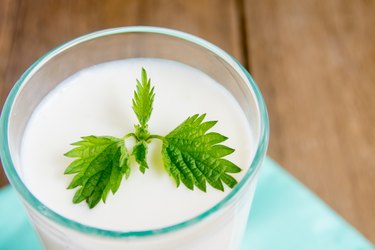
Bulgaros is another name for kefir, a fermented milk product made by adding a starter culture, called kefir grain, to milk. The term "grain" describes the starter culture's cauliflower-like appearance. Fermented food products often contain probiotics, bacteria thought to prevent the growth of unhealthy bacteria in the intestines. Alternative practitioners claim many benefits for foods high in probiotics, but not all hold up to close scrutiny in clinical trials.
Actions
Video of the Day
You can't make kefir or bulgaros without a starter culture. Simply mixing the microorganisms present in the starter culture into milk doesn't produce the same results. Bulgaros contains Lactobacillus bacteria and lactose fermenting yeasts, which produce lactic and acetic acid. The antibacterial properties of bulgaros come at least in part from its high acid content; properly fermented bulgaros has an acidic pH of 4.5 or less, according to the National Center for Home Food Preservation.
Video of the Day
Gastrointestinal Benefits
Bulgaros contains lactase, an enzyme necessary for the breakdown of lactose, the primary milk sugar. If you have lactose intolerance, your intestines don't produce enough lactase. Eating dairy products can cause intestinal symptoms such as gas, bloating, diarrhea and stomach cramping. Bulgaros can reduce your lactose intolerance symptoms. The healthy bacteria in bulgaros might also help reduce your risk of gastrointestinal infections. A study conducted by The Ohio State University and reported in the May 2003 "Journal of the American Dietetic Association" found that kefir improved lactose digestion and decreased abdominal symptoms of lactose intolerance, although the sample size was small.
Other Health Benefits
Laboratory studies have examined the effects of bulgaros, or kefir, on high cholesterol and diseases such as cancer. In some laboratory studies, the mixture has shown benefit in destroying cancer cells. A Canadian study reported in the September 2007 issue of the "Journal of Medicinal Food" found that kefir extracts killed breast cancer cells but not normal breast cells in the laboratory. This might have application toward treating or preventing breast cancer cell growth. However, laboratory studies use special starter cultures; commercially produced versions of bulgaros might not have the same effects in humans, "The Los Angeles Times" cautions in a September 2008 article.
Cholesterol Benefits
Some alternative practitioners suggest bulgaros might have benefits as a cholesterol-lowering agent. A Canadian study published in the January 2002 online issue of "BMC Complementary and Alternative Medicine" on the effects of kefir in lowering cholesterol in men with high cholesterol levels found no benefit to drinking kefir. A Taiwanese hamster study reported in the May 2006 "British Journal of Nutrition" found that soyamilk, milk-kefir and soyamilk-kefir all lowered triglyceride and cholesterol levels, with the soyamilk-kefir mixture having the greatest effect on cholesterol levels.
- Los Angeles Times: Kefir's Good But May Not Merit a Halo
- Colorado State University: Kefir Milk: Fermentation and Safety
- Journal of the American Dietetic Association: Kefir Improves Lactose Digestion and Tolerance in Adults with Lactose Maldigestion
- BMC Complementary and Alternative Medicine: Kefir Consumption Does Not Alter Plasma Lipid Levels or Cholesterol Fractional Synthesis Rates Relative to Milk in Hyperlipidemic Men: A Randomized Controlled Trial
- National Center for Home Food Preservation: Fermented Foods: Kefir
- Journal of Medicinal Food: Kefir Extracts Suppress In Vitro Proliferation of Estrogen-Dependent Human Breast Cancer Cells But Not Normal Mammary Epithelial Cells
- British Journal of Nutrition: Hypocholesterolaemic Effects of Milk-Kefir and Soyamilk-Kefir in Cholesterol-Fed Hamsters
- Natural Standard: Kefir